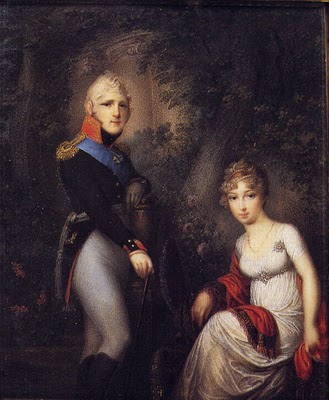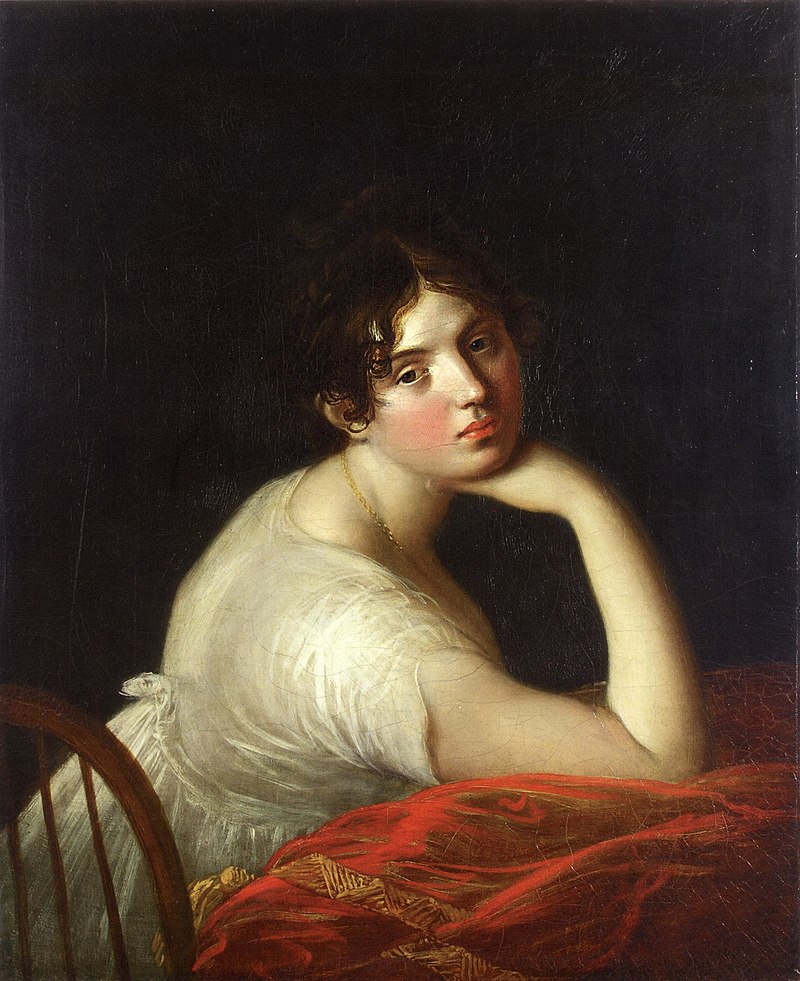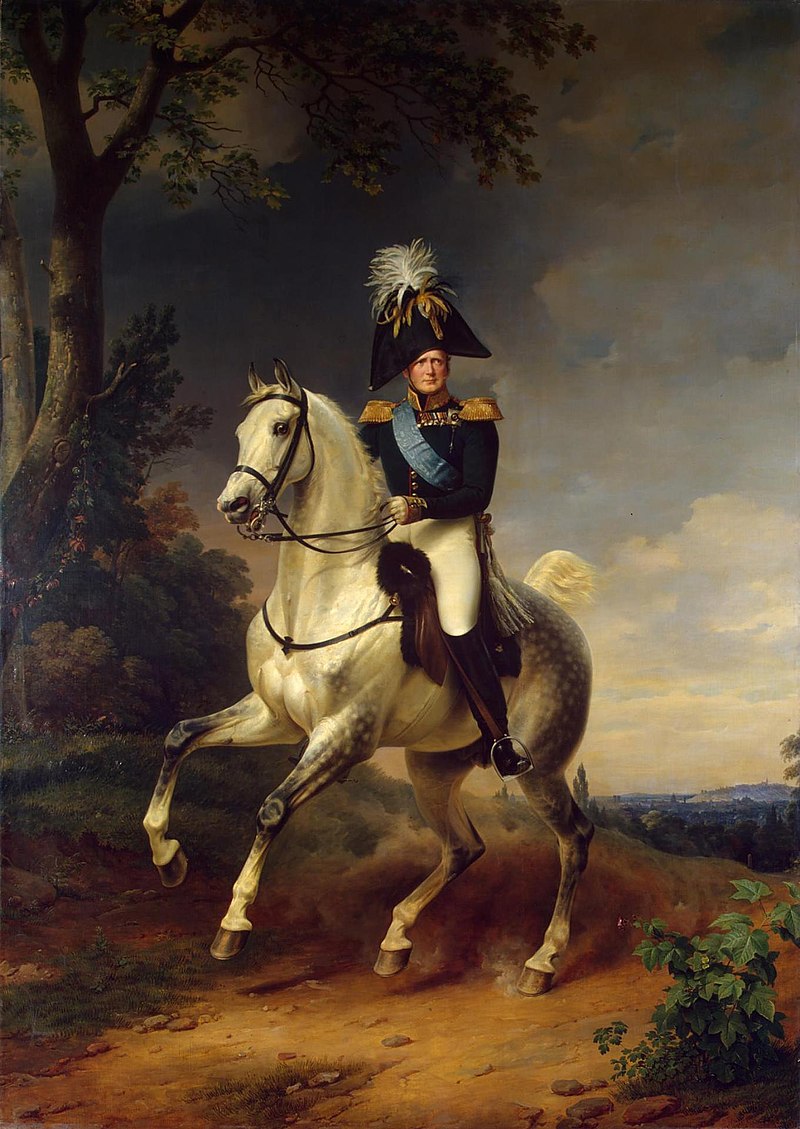by Susan Flantzer
© Unofficial Royalty 2018

Alexander I, Emperor of All Russia; Credit – Wikipedia
The eldest of the ten children of Paul I, Emperor of All Russia and his second wife Sophia Dorothea of Württemberg (Empress Maria Feodorovna), Alexander I, Emperor of All Russia (Alexander Pavlovich) was born in St. Petersburg, Russia on December 23, 1777. He was named Alexander by his grandmother Catherine II (the Great), Empress of All Russia in honor of Alexander Nevsky, a famous 13th-century ruling prince from the Rurik dynasty who is a saint in the Russian Orthodox religion. Three months after his birth, Empress Catherine took the infant Alexander to live in her apartments so she could raise him, apparently forgetting the pain she felt when Elizabeth I, Empress of All Russia took away her own son Paul so she could raise him. In 1779, when Paul and Maria Feodorovna had a second son, Empress Catherine named him Constantine after the Roman emperor of the fourth century, Constantine the Great. Constantine joined his brother Alexander in their grandmother’s apartments.

Alexander and Constantine; Credit – Wikipedia
Alexander had nine younger siblings:
- Grand Duke Constantine Pavlovich (1779 – 1831), married (1) Juliane of Saxe-Coburg-Saalfeld (Anna Feodorovna), no children, marriage annulled (2) Joanna Grudzińska, no children, a morganatic marriage that cost Constantine the crown
- Grand Duchess Alexandra Pavlovna (1783 – 1801), married Archduke Joseph of Austria, Count Palatine of Hungary, had one daughter who died at birth, Alexandra died of childbirth complications a week later
- Grand Duchess Elena Pavlovna (1784 – 1803), married Friedrich Ludwig, Hereditary Grand Duke of Mecklenburg-Schwerin, had two children
- Grand Duchess Maria Pavlovna (1786 – 1859), married Karl Friedrich, Grand Duke of Saxe-Weimar-Eisenach, had four children including Augusta who married Wilhelm I, German Emperor, King of Prussia
- Grand Duchess Catherine Pavlovna (1788 – 1819), married (1) Georg of Oldenburg, had two sons (2) King Wilhelm I of Württemberg, had two daughters including Sophie who married King Willem III of the Netherlands
- Grand Duchess Olga Pavlovna (1792 – 1795), died in early childhood
- Grand Duchess Anna Pavlovna (1795 – 1865), married King Willem II of the Netherlands, had five children including King Willem III of the Netherlands
- Nicholas I, Emperor of All Russia (1796 – 1855), married Charlotte of Prussia (Alexandra Feodorovna), had ten children including Alexander II, Emperor of All Russia
- Grand Duke Michael Pavlovich (1798 – 1849), married Charlotte of Württemberg (Elena Pavlovna), had five children

Alexander (on the left) with his parents and his sibling in 1800; Credit – Wikipedia
Alexander began his education at the age of six under the tutelage of General Nikolai Ivanovich Saltykov. Within a few years, Frédéric-César de La Harpe from Switzerland became Alexander’s tutor with Saltykov becoming his military tutor. La Harpe exposed Alexander to the principles of the humanity of the philosopher Jean-Jacques Rousseau while Saltykov taught him the traditions of the Russian aristocracy. From his father Paul, who had weekly visits with his son, Alexander developed a passion for all things military. By the time he was fourteen, Alexander was quite tall and developing a fascination with women. His grandmother Catherine the Great decided it was time to find him a bride.

Louise of Baden; Credit – Wikipedia
Looking over a list of eligible princesses, Catherine the Great was favorably impressed by twelve-year-old Louise of Baden, a daughter of Karl Ludwig, Hereditary Prince of Baden and Amelia Frederica of Hesse-Darmstadt. Louise and her younger sister Frederica (who eventually married King Gustav IV Adolf of Sweden), went to St. Petersburg, Russia in the fall of 1792. Empress Catherine was enchanted with the young princess and Louise was attracted to the tall, handsome Alexander. Louise stayed in Russia to learn the Russian language and convert to Russian Orthodoxy. She exchanged her birth name for Elizabeth Alexeievna and became a Grand Duchess of Russia. The couple was formally betrothed in May 1793 and the wedding occurred on September 28, 1793. The bride was fourteen and the groom was fifteen. Catherine the Great had the Alexander Palace at Tsarskoye Selo built for Alexander and Elizabeth Alexeievna on the occasion of their marriage.

Alexander and Louise; Credit – Wikipedia
Alexander and Elizabeth Alexeievna had two daughters who both died in early childhood.
- Grand Duchess Maria Alexandrovna (1799 – 1800)
- Grand Duchess Elizabeth Alexandrovna (1806 – 1808)
Catherine II (the Great), Empress of All Russia never considered inviting her son Paul to share her power in governing Russia. Once Alexander was born, it appeared that Catherine had found a more suitable heir. It is possible that Catherine intended to bypass her son Paul and name her grandson Alexander as her successor but she never got the chance. On November 4, 1796, Catherine suffered a stroke. Despite all attempts to revive her, she fell into a coma from which she never recovered. Catherine II (the Great), Empress of All Russia died on November 6, 1796, and Paul was now Emperor of All Russia.
During the reign of Emperor Paul, Alexander and Elizabeth Alexeievna’s marriage started to falter. Alexander started a long-term affair with Maria Antonovna Naryshkina in 1799 and Elizabeth Alexeievna sought affection with her husband’s friend Prince Adam Czartoryski, a Polish noble. In 1799, Elizabeth Alexeievna gave birth to a daughter Maria Alexandrovna, who had dark eyes and dark hair like Prince Adam Czartoryski, unlike the blond hair and blue eyes of both Alexander and Elizabeth Alexeievna. Sadly, the child died when she was 13 months old.

Maria Antonovna Naryshkina, Alexander’s long-term mistress; Credit – Wikipedia
As Emperor, Alexander’s father Paul agreed with the practices of autocracy and tried to prevent liberal ideas in the Russian Empire. He did not tolerate freedom of thought or resistance against autocracy. Because he overly taxed the nobility and limited their rights, the Russian nobles, by increasing numbers, were against him. Paul’s reign was becoming increasingly despotic. Eventually, the nobility reached their breaking point. As early as the end of 1797, rumors began swirling of a coup d’état being prepared by the nobility. Alexander probably knew of the coup d’état plans.
Afraid of intrigues and assassination plots, Paul disliked the Winter Palace where he never felt safe so he fortified Mikhailovsky Castle in Saint Petersburg. In February 1801, Paul and his family moved into Mikhailovsky Castle. On the night of March 23, 1801, only forty days after moving into the castle, a group of conspirators charged into Paul’s bedroom, forced him to abdicate, and then strangled and trampled him to death. Alexander, who probably knew about the coup but not the murder plot, succeeded as Alexander I, Emperor of All Russia at the age of 23.
When Alexander was informed about the murder of his father, he sobbed. One of the conspirators told Alexander, “Time to grow up! Go and rule!” Alexander went out on the palace balcony to show himself to the troops and said: “My father died of apoplexy. I will be like my grandmother.” None of the conspirators of the coup d’état that resulted in the murder of Emperor Paul were punished. On the first day of his reign, Alexander freed 12,000 prisoners sentenced by his father to prison or exile without a trial. Within a month, Alexander began restoring freedoms that his father revoked. Alexander and Elizabeth Alexeievna were crowned on September 15, 1801, at the Assumption Cathedral in the Moscow Kremlin.

Illumination at Soboronaya Square in the Moscow Kremlin on the occasion of the coronation of Alexander I by Fyodor Yakovlevich Alekseyev, 1802; Credit – Wikipedia
After Alexander became Emperor, his marriage was one in name only. Both Alexander and Elizabeth Alexeievna fulfilled their duties as Emperor and Empress. However, Alexander continued his long-term affair with Maria Antonovna Naryshkina and Elizabeth Alexeievna continued her affair with Prince Adam Czartoryski. This affair lasted until Elizabeth Alexeievna began a new affair with Captain Alexis Okhotnikov. In 1806, Elizabeth Alexeievna gave birth to another daughter, Elizabeth Alexandrovna, who died of an infection when she was 17 months old. Rumors circulated that Elizabeth Alexandrovna was really the daughter of Alexis Okhotnikov. In 1807, Alexis Okhotnikov was killed and suspicions arose that either Emperor Alexander I or his brother Grand Duke Constantine Pavlovich had ordered him killed. Although the death of Elizabeth Alexandrovna brought Alexander and Elizabeth Alexeievna temporarily closer, they had no more children. Besides, Maria Maryshkina, Alexander had several mistresses and, according to some estimates, could have had up to eleven illegitimate children.
Accomplishments of the reign of Alexander I, Emperor of All Russia include:
- Formation of an advisory privy council
- Replacing Peter the Great’s old government departments with eight ministries: foreign affairs, military ground forces, naval forces, internal affairs, finance, justice, commerce, education
- Establishment of the State Council of the Russian Empire, the highest legislative body of the Russian Empire in 1810-1906. Members were appointed and dismissed by the emperor.
- Financial reform
- Reorganization of educational institutions and free education at the lower levels
- Establishment of military settlements – the system of organizing troops combining military service with the employment of productive labor, primarily, agricultural

Equestrian painting of Emperor Alexander I by Franz Krüger (1812); Credit – Wikipedia
The most important military event during Alexander’s reign was the Napoleonic Wars, a series of major conflicts (1803 – 1815) pitting the French Empire and its allies, led by Napoleon I, against various coalitions of European powers. At first, it seemed that Alexander and Russia might come to terms with Napoleon and France. However, when Alexander’s former tutor Frédéric-César de La Harpe returned from a trip to France and presented Alexander with his Reflections on the True Nature of the Consul for Life about Napoleon’s tyranny, Alexander changed his mind. Russia fought with the coalition against Napoleon and France.
In 1812, Napoleon’s army invaded Russia, called the Patriotic War of 1812 in Russia. Napoleon hoped to force Alexander to stop trading with British merchants in an effort to pressure the United Kingdom to sue for peace. The French forces eventually were repelled by the brutal Russian winter and retreated to the borders of Russia, pursued by the Russian army. The Patriotic War of 1812 ended with the almost complete destruction of the French army. It was the motivation for composer Pyotr Ilyich Tchaikovsky’s 1812 Overture, written in 1882 to commemorate the 70th anniversary of Russia’s defense against Napoleon’s invading army in 1812. Napoleon’s eventual downfall left Alexander as one of the most powerful rulers in Europe. Alexander was one of the leaders at the Congress of Vienna (September 1814 – June 1815), which established a new European order.
In 1819, Alexander was named as a godfather to the daughter of Prince Edward, Duke of Kent and the granddaughter of King George III of the United Kingdom. The little princess’ paternal uncle Prince Frederick, Duke of York, stood proxy for Emperor Alexander at the christening. The princess was given the names Alexandrina, in honor of Alexander I, Emperor of All Russia, and Victoria, in honor of her mother. She was called Drina as a child but history knows her as Queen Victoria of the United Kingdom.
Toward the end of his life, Alexander became very involved in religious mysticism, ended his long-term affair, and somewhat reconciled with his wife. By 1825, Elizabeth Alexeievna’s health was suffering due to lung problems and the doctors recommended getting away from the harsh climate of St. Petersburg. Alexander and Elizabeth Alexeievna relocated to the city of Taganrog, Russia by the Sea of Azov where they stayed in a modest house. In November 1825, Alexander returned to Taganrog after visiting Crimea. He had a cold, which developed into typhus. On December 1, 1825, 47-year-old Alexander I, Emperor of All Russia died in Elizabeth Alexeievna’s arms in their home in Taganrog.

Death of Alexander I; Credit – Wikipedia
Elizabeth Alexeievna survived her husband by five months. While traveling back to St. Petersburg for her husband’s funeral, she felt so sick that had to stop at Belev in Tula Province, Russia. On the morning of May 16, 1826, Elizabeth Alexeievna’s maid went to check on her and found her dead in bed of heart failure at the age of 47. Elizabeth Alexeievna and her husband were buried at the Peter and Paul Cathedral in St. Petersburg.

Tombs of Alexander I and Elizabeth Alexeievna; Photo Credit: Wikipedia
This article is the intellectual property of Unofficial Royalty and is NOT TO BE COPIED, EDITED, OR POSTED IN ANY FORM ON ANOTHER WEBSITE under any circumstances. It is permissible to use a link that directs to Unofficial Royalty.
Romanov Resources at Unofficial Royalty
- Tsardom of Russia/Russian Empire Index
- Romanov Births, Marriages and Deaths
- Romanov Burial Sites
- Romanovs Killed During the Russian Revolution
- Romanovs Who Survived the Russian Revolution
Works Cited
- De.wikipedia.org. (2018). Alexander I. (Russland). [online] Available at: https://de.wikipedia.org/wiki/Alexander_I._(Russland) [Accessed 28 Jan. 2018].
- En.wikipedia.org. (2018). Alexander I of Russia. [online] Available at: https://en.wikipedia.org/wiki/Alexander_I_of_Russia [Accessed 28 Jan. 2018].
- Lincoln, W. Bruce. (1981). The Romanovs: Autocrats of All the Russias. New York, NY.: Doubleday
- Massie, R. (2016). Catherine the Great. London: Head of Zeus.
- Ru.wikipedia.org. (2018). Александр I. [online] Available at: https://ru.wikipedia.org/wiki/%D0%90%D0%BB%D0%B5%D0%BA%D1%81%D0%B0%D0%BD%D0%B4%D1%80_I [Accessed 28 Jan. 2018].
